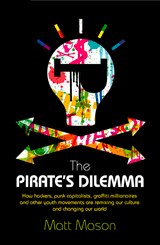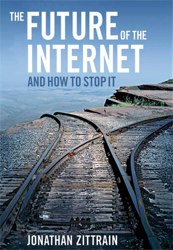
Auch Matt Mason gibt sein Buch The Pirate’s Dilemma gratis her. Bzw: It’s up to you.
The Pirate’s Dilemma tells the story of how youth culture drives innovation and is changing the way the world works. It offers understanding and insight for a time when piracy is just another business model, the remix is our most powerful marketing tool and anyone with a computer is capable of reaching more people than a multi-national corporation.
Do we fight pirates, or do we learn from them?
Ideas that started within punk, disco, hip-hop, rave, graffiti and gaming have been combined with new technologies and taken to new heights by the generations that grew up under their influence. With a cast of characters that includes such icons as The Ramones, Andy Warhol, Madonna, Russell Simmons, Pharrell and 50 Cent, The Pirate’s Dilemma uncovers, for the first time, the trends that transformed underground scenes into burgeoning global industries and movements, ultimately changing life as we know it, unraveling some of our most basic assumptions about business, society and our collective future.
As a result people, companies and organizations are now struggling with a new dilemma in increasing numbers. As piracy continues to change the way we all use information, how should we respond? Do we fight pirates, or do we learn from them? Should piracy be treated as a problem, or a solution? To compete or not to compete – that is the question √¢‚Ǩ‚Äú that is the Pirate’s Dilemma, perhaps one of the most important economic and cultural conundrums of the 21st Century.

Jonathan Zittrain: The Future of the Internet – And How to Stop It:
This extraordinary book explains the engine that has catapulted the Internet from backwater to ubiquity—and reveals that it is sputtering precisely because of its runaway success. With the unwitting help of its users, the generative Internet is on a path to a lockdown, ending its cycle of innovation—and facilitating unsettling new kinds of control.
IPods, iPhones, Xboxes, and TiVos represent the first wave of Internet-centered products that can’t be easily modified by anyone except their vendors or selected partners. These √¢‚Ǩ≈ìtethered appliances√¢‚Ǩ¬ù have already been used in remarkable but little-known ways: car GPS systems have been reconfigured at the demand of law enforcement to eavesdrop on the occupants at all times, and digital video recorders have been ordered to self-destruct thanks to a lawsuit against the manufacturer thousands of miles away. New Web 2.0 platforms like Google mash-ups and Facebook are rightly touted√¢‚Ǩ‚Äùbut their applications can be similarly monitored and eliminated from a central source. As tethered appliances and applications eclipse the PC, the very nature of the Internet√¢‚Ǩ‚Äùits √¢‚Ǩ≈ìgenerativity,√¢‚Ǩ¬ù or innovative character√¢‚Ǩ‚Äùis at risk.
The Internet’s current trajectory is one of lost opportunity. Its salvation, Zittrain argues, lies in the hands of its millions of users. Drawing on generative technologies like Wikipedia that have so far survived their own successes, this book shows how to develop new technologies and social structures that allow users to work creatively and collaboratively, participate in solutions, and become true √¢‚Ǩ≈ìnetizens.√¢‚Ǩ¬ù
Das Buch wurde unter einer Creative Commons-Lizenz veröffentlicht und gibt es als Gratis PDF oder als Hardcover für 20 Dollar.

